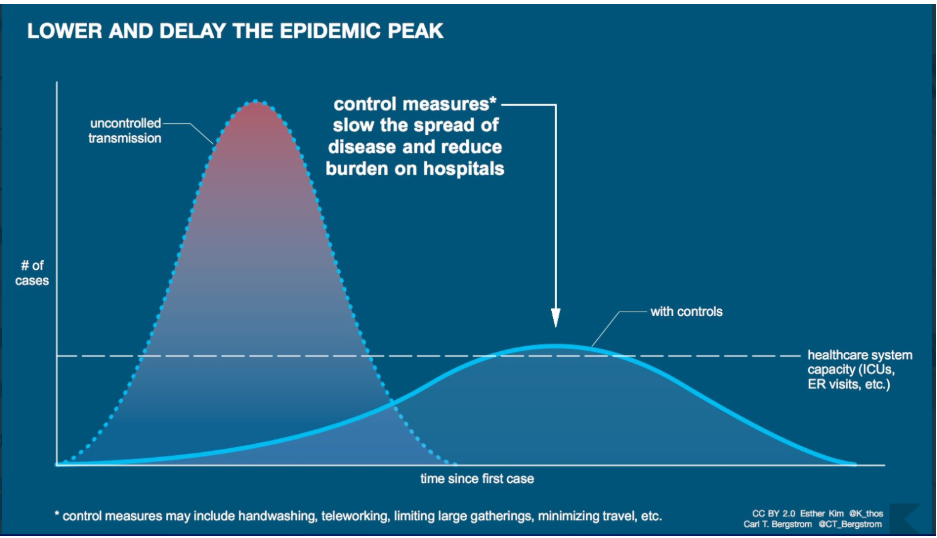https://www.weforum.org/agenda/2020/03/this-one-chart-shows-why-minimizing-coronavirus-impact-is-a-race-against-time?fbclid=IwAR2LLjve6hDwstveGJ9ALEvX_LFLoo684eXp6EGTLINKXit1vfJCvcqJLJc
Minimizing Coronavirus’ impact is a race against time - this chart explains why

Empty restaurant tables are seen in St. Mark's Square as the Italian government prepares to adopt new measures to contain the spread of Coronavirus in Venice, Italy
Image: REUTERS/Manuel Silvestri
08 Mar 2020
- The impact of Coronavirus must be minimized to prevent overwhelming healthcare systems.
- International preparedness for pandemics is "fundamentally weak," according to one recent 195-country study.
- Coordination on community- and international levels can help reduce the rate of new infections.
Coronavirus continues to spread, highlighting the need to minimize its impact and slow the rate of new infections.
One chart, shared widely on Twitter yesterday by Carl T. Bergstrom, a University of Washington researcher and expert on fighting coronavirus misinformation, helps demonstrate the importance of fast action.

The flattened curve shows how a reduced rate of coronavirus infection could reduce the impact on hospitals and the wider healthcare system
Image: Esther Kim, Carl T. Bergstrom
This chart shows two curves with two very different virus reproduction rates. In the steepest curve, the virus reproduces quickly in a short period of time. In this scenario, emergency rooms, intensive care units and other parts of the health care system are overwhelmed. In an overwhelmed system, mortality rates can be high and those infected may not get the treatment they need.
In the second, flatter curve, controls help slow the spread of the virus. Infections occur, but over a longer period of time. Since health care workers and facilities are not overwhelmed, those infected receive better treatment and fewer deaths occur.
Not overwhelming the healthcare system will be key to minimizing further impact. Italy, hit hard by the virus, demonstrates the challenges faced when thousands of cases hit hospitals in quick succession.
Not overwhelming the healthcare system will be key to minimizing further impact. Italy, hit hard by the virus, demonstrates the challenges faced when thousands of cases hit hospitals in quick succession.
In some Italian hospitals, as the New York Times has reported, all but the most important surgeries have been suspended to focus resources on the virus. And in some Italian cities, doctors and nurses work non-stop, ambulances can be hard to find and, in some cases, emergency hotlines divert to recorded messages.
Italy is not alone - and many countries are ill-prepared to fight a pandemic, according to the inaugural Global Health Security Index (GHS). This 195-country study found national health security is “fundamentally weak” around the world.

Countries vary in their preparedness for a pandemic, as this recent ranking shows.
Image: Global Health Security Index
“The results are alarming,” said Ernest J. Moniz, a CEO for the Nuclear Threat Initiative, one of the study’s co-partners. In a statement he said, “All countries - at all income levels - have major gaps in their capabilities, and they aren’t sufficiently investing in biological preparedness.”
Fortunately, efforts can be taken. On a broader scale, the GHS index recommends that government leaders should invest in any preparedness gaps and coordinate internationally to tackle financing and emergency response needs.
Have you read?
On a community level, individiduals can do their part through diligent handwashing, minimizing travel, working remotely and cancelling large gatherings.
“The steps we take now, individually and as a community, will determine the trajectory of the Coronavirus epidemic. This in turn will determine how many lives are lost," Bergstrom argues.
Bergstom's Twitter thread yesterday was prompted by reportage first published in The Economist and a chart created by visual journalist Rosamund Pearce. Bergstrom said he'd never seen a piece of "sci-comm matter so much."
To help spread the word, Bergstrom and an illustrator named Esther Kim created a version of the chart that could be shared widely.
To help spread the word, Bergstrom and an illustrator named Esther Kim created a version of the chart that could be shared widely.
“It is not just a matter of protecting yourself; it is a matter of protecting the most vulnerable among us.”
Share
License and Republishing
World Economic Forum articles may be republished in accordance with our Terms of Use.





沒有留言:
張貼留言